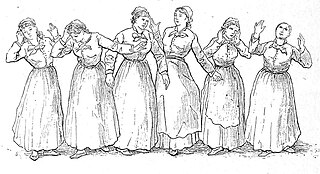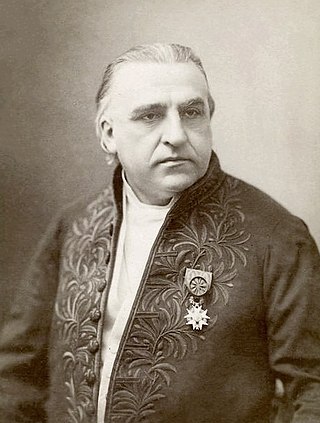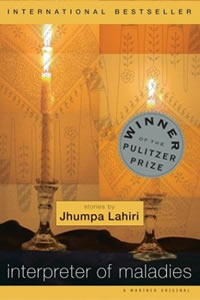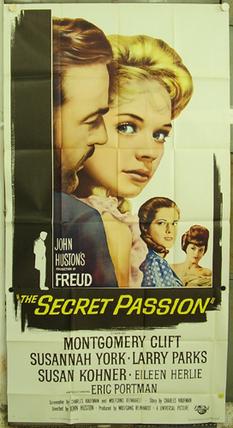
Phineas Parkhurst Quimby was an American folk healer, mentalist and mesmerist. His work is widely recognized as foundational to the New Thought spiritual movement.

Hysteria is a term used to mean ungovernable emotional excess and can refer to a temporary state of mind or emotion. In the nineteenth century, female hysteria was considered a diagnosable physical illness in women. It is assumed that the basis for diagnosis operated under the belief that women are predisposed to mental and behavioral conditions; an interpretation of sex-related differences in stress responses. In the twentieth century, it shifted to being considered a mental illness. Many influential people such as Sigmund Freud and Jean-Martin Charcot dedicated research to hysteria patients.

Jean-Martin Charcot was a French neurologist and professor of anatomical pathology. He worked on groundbreaking work about hypnosis and hysteria, in particular with his hysteria patient Louise Augustine Gleizes. Charcot is known as "the founder of modern neurology", and his name has been associated with at least 15 medical eponyms, including various conditions sometimes referred to as Charcot diseases.

Les Visiteurs is a French fantasy comedy film directed by Jean-Marie Poiré and released in 1993. In the film, a 12th-century knight and his squire travel in time to the end of the 20th century and find themselves adrift in modern society.

The Imaginary Invalid, The Hypochondriac, or The Would-Be Invalid is a three-act comédie-ballet by the French playwright Molière with dance sequences and musical interludes by Marc-Antoine Charpentier. It premiered on 10 February 1673 at the Théâtre du Palais-Royal in Paris and was originally choreographed by Pierre Beauchamp.

Interpreter of Maladies is a book collection of nine short stories by American author of Indian origin Jhumpa Lahiri published in 1999. It won the Pulitzer Prize for Fiction and the Hemingway Foundation/PEN Award in the year 2000 and has sold over 15 million copies worldwide. It was also chosen as The New Yorker's Best Debut of the Year and is on Oprah Winfrey's Top Ten Book List.

Possessed is a 2000 American horror television film directed by Steven E. de Souza, written by de Souza and Michael Lazarou, and starring Timothy Dalton. The film is based on events appearing in the 1993 book Possessed by Thomas B. Allen, which was inspired by the exorcism case of Roland Doe.

Day of the Dead 2: Contagium is a 2005 horror film written by Ana Clavell and directed by Clavell and James Dudelson, starring Justin Ipock, Laurie Maria Baranyay and John F. Henry III. It was unofficially marketed as a prequel and sequel to 1985's Day of the Dead. The film was released direct-to-video in the United States on October 18, 2005.

“A Country Doctor” is a short story written in 1917 by Franz Kafka. It was first published in the collection of short stories of the same title. In the story, a country doctor makes an emergency visit to a sick patient on a winter night. The doctor faces absurd, surreal predicaments that pull him along and finally doom him.

The Fire Within is a 1963 drama film written and directed by Louis Malle. It is based on the 1931 novel Will O' the Wisp by Pierre Drieu La Rochelle, which was inspired by the life of poet Jacques Rigaut. The film stars Maurice Ronet and features Léna Skerla, Jean-Paul Moulinot, Bernard Tiphaine, Bernard Noël, Jeanne Moreau, Jacques Sereys, and Alexandra Stewart in supporting roles. The score consists of music composed by Erik Satie and performed by pianist Claude Helffer.

Private Psycho Lesson is a hentai anime created by U-jin in 1996. It contains two episodes, both stories showcase Dr. Sara Iijima, a beautiful and buxom psychiatrist and her unique therapeutic abilities, as well as the adventures she gets into. There's also one volume of manga.

Freud: The Secret Passion, or simply Freud, is a 1962 American biographical drama film directed by John Huston and produced by Wolfgang Reinhardt. Based on the life of Austrian neurologist Sigmund Freud, it stars Montgomery Clift as Freud and Susannah York as his patient Cecily Koertner. Other cast members include Larry Parks, Susan Kohner, Eileen Herlie, Eric Portman, and David McCallum. The screenplay was by Charles Kaufman and Reinhardt, with some elements from a script by Jean-Paul Sartre, who withdrew his name from the film.
"Mirror Mirror" is the fifth episode of the fourth season of House and the seventy-fifth episode overall. It aired on Fox on October 30, 2007.

Stéphanie Alexandra Mina Sokolinski, known professionally as Soko, is a French singer and actress. She released her debut single "I'll Kill Her" in 2007. It achieved airplay success in several European countries as well as Australia, peaking at number three on the Danish music charts, and was included on her debut EP Not Sokute (2007). Her debut studio album I Thought I Was an Alien was released in 2012 and contains the single "We Might Be Dead by Tomorrow", which achieved ninth place on the Billboard Hot 100. Ensuing years saw the releases of her second and third studio albums My Dreams Dictate My Reality (2015) and Feel Feelings (2020).

Slaughter Hotel, also known as Asylum Erotica and Cold Blooded Beast, is a 1971 Italian thriller erotic film directed by Fernando Di Leo and starring Klaus Kinski. The film follows a masked killer murdering the wealthy female inmates of a sanitorium. The building that was used as the mental hospital in this film was used several years earlier as the set for the 1966 giallo The Murder Clinic.

The Hypnotic Eye is a 1960 horror film, released by Allied Artists on February 27, 1960, starring Jacques Bergerac, Allison Hayes, Merry Anders, Eric "Big Daddy" Nord, and Ferdinand Demara, billed as "Fred Demara".

Navaratri is a 1966 Telugu-language drama film, produced by A. V. Subba Rao under the Prasad Art Pictures banner and directed by T. Rama Rao. It stars Akkineni Nageswara Rao and Savitri, with music composed by T. Chalapathi Rao. The film is a remake of the Tamil film with the same title (1964), and has Savitri reprising her role. Nageswara Rao got high critical acclaim for his portrayal of nine characters. This film is regarded to have some of the finest ever performances by him. In the song Addala Meda Vundi, heavy star cast Jayalalitha, Kanchana, Jamuna and Girija make guest appearances as patients admitted in mental hospital.

Alice Winocour is a French screenwriter and director.
The Ruling Class is a 1968 British play by Peter Barnes. The black comedy centres on Jack Arnold Alexander Tancred Gurney, the 14th Earl of Gurney and the attempts to cure him of insanity.

Louise Augustine Gleizes, known as Augustine or A, was a French woman who was publicly exhibited as a "hysteria" patient by neurologist Jean-Martin Charcot while she was held at the Salpêtrière Hospital in Paris.


















